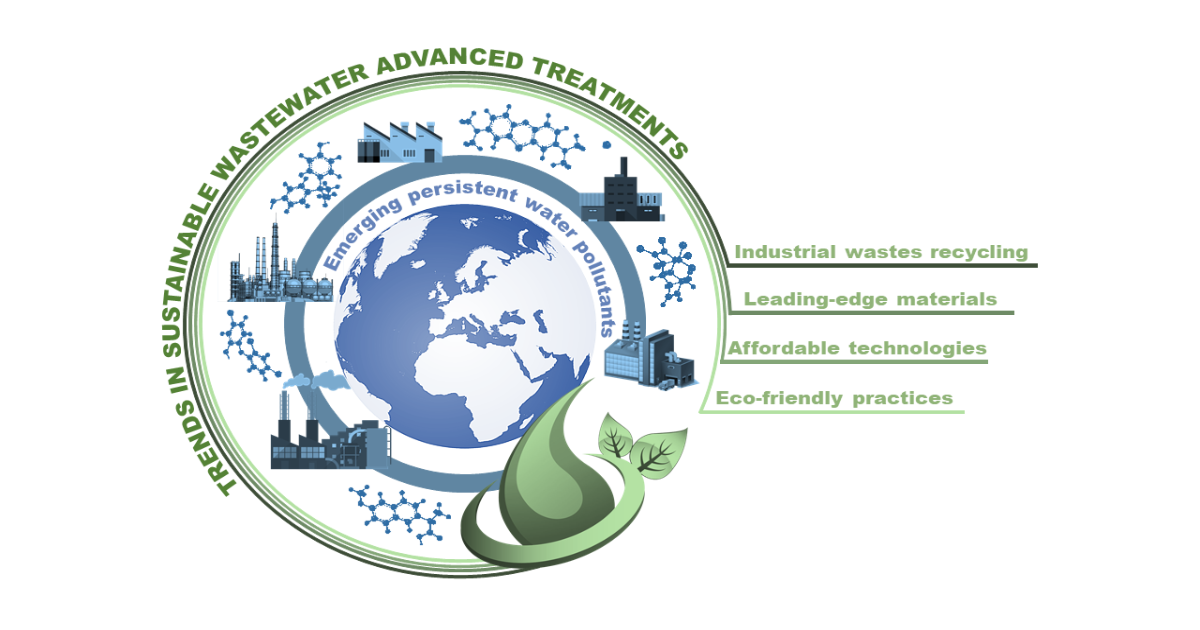Sustainable Solutions for Wastewater Treatment and Recycling
A special issue of Sustainability (ISSN 2071-1050). This special issue belongs to the section "Waste and Recycling".
Deadline for manuscript submissions: 31 January 2026 | Viewed by 2674

Special Issue Editors
Interests: adsorbent materials preparation; characterization; gels formulation; water pollutants adsorption; food waste valorization; bioactive compounds extraction
Special Issues, Collections and Topics in MDPI journals
Interests: wastewater treatment; water pollutants adsorption; design of food and chemical engineering processes; mathematical modeling and optimization
Special Issue Information
Dear Colleagues,
As human activities, industrialization, pick-up speed, and water contamination with a whole panoply of persistent compounds (e.g., pharmaceuticals, dyes, pesticides, heavy metals, etc.) are becoming a foremost concern. Even at a reduced concentration, due to their severe toxicity to biological amplification and accumulation, these contaminants are considered serious hazards. Prevalent methods for eliminating pollutants from water continue to require excessive energy and chemical consumption, simultaneously leading to secondary contamination, while the treatment often remains incomplete. Many environmental scientists are now primarily focused on making wastewater management both safe and effective in order to successfully treat and recycle the wastewater, mitigate the harmful effects of water pollutants, and assist in preserving freshwater resources.
This Special Issue aims to make available the opportunity to share the most recent investigations and results from the field of safe and effective wastewater management. Outcomes successfully applicable to the treatment and recycling of wastewater, mitigating the harmful effects of water pollutants and preserving freshwater resources, are expected.
We kindly invite willing authors to submit research articles, reviews, case studies, etc., with ground-breaking approaches focusing on (but not limited to) the following areas:
- industrial waste recycling in view of the use of wastewater treatment;
- preparation of cutting-edge materials and their application for water decontamination;
- development of new and affordable technologies capable of removing water pollutants;
- implementation of eco-friendly practices and methodologies in wastewater depollution;
- design, optimization, and evaluation of sustainable wastewater treatment processes.
Contributions that are innovative and respectful of the environmental paradigm, particularly those highlighting chemical, biological, or physical processes (advanced oxidation processes, ozonation, electrochemical methods, coagulation, flocculation, adsorption, bioremediation, etc.), are also welcome.
We look forward to receiving your contributions.
Dr. Cristina-Gabriela Grigoraș
Dr. Andrei Ionut Simion
Guest Editors
Manuscript Submission Information
Manuscripts should be submitted online at www.mdpi.com by registering and logging in to this website. Once you are registered, click here to go to the submission form. Manuscripts can be submitted until the deadline. All submissions that pass pre-check are peer-reviewed. Accepted papers will be published continuously in the journal (as soon as accepted) and will be listed together on the special issue website. Research articles, review articles as well as short communications are invited. For planned papers, a title and short abstract (about 250 words) can be sent to the Editorial Office for assessment.
Submitted manuscripts should not have been published previously, nor be under consideration for publication elsewhere (except conference proceedings papers). All manuscripts are thoroughly refereed through a single-blind peer-review process. A guide for authors and other relevant information for submission of manuscripts is available on the Instructions for Authors page. Sustainability is an international peer-reviewed open access semimonthly journal published by MDPI.
Please visit the Instructions for Authors page before submitting a manuscript. The Article Processing Charge (APC) for publication in this open access journal is 2400 CHF (Swiss Francs). Submitted papers should be well formatted and use good English. Authors may use MDPI's English editing service prior to publication or during author revisions.
Keywords
- emerging persistent water pollutants
- wastewater decontamination
- sustainable water management
- industrial waste revalorization
- added value products
- process optimization
- sustainable environmental applications
Benefits of Publishing in a Special Issue
- Ease of navigation: Grouping papers by topic helps scholars navigate broad scope journals more efficiently.
- Greater discoverability: Special Issues support the reach and impact of scientific research. Articles in Special Issues are more discoverable and cited more frequently.
- Expansion of research network: Special Issues facilitate connections among authors, fostering scientific collaborations.
- External promotion: Articles in Special Issues are often promoted through the journal's social media, increasing their visibility.
- Reprint: MDPI Books provides the opportunity to republish successful Special Issues in book format, both online and in print.
Further information on MDPI's Special Issue policies can be found here.






